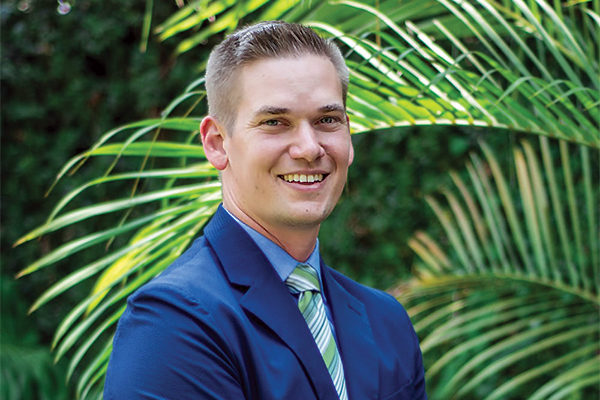Young Alumnus: Frank Bergh

The writer Isaac Asimov is quoted as saying “Science can amuse and fascinate us all, but it is engineering that changes the world.” Washington University in St. Louis Engineering alumnus Frank Bergh has taken that to heart, using his education to take electricity to remote regions of the world and changing the lives of those getting electricity for the first time.
Bergh, who earned a bachelor’s degree in electrical engineering with a minor in Spanish in 2008, has spent much of the past several years working to set up microgrids and off-grid solar energy systems in sub-Saharan Africa. After several jobs working in wind and solar energy, Bergh is now a senior electrical engineer with the National Rural Electric Cooperative Association International (NRECA), a nonprofit cooperative whose rural electrification initiatives have reached 160 million people in 65 developing countries since 1962. As NRECA’s first specialist on microgrids and renewable energy, Bergh is working on off-grid systems for rural communities and national electrification strategies for several countries in Africa, as well as consulting with U.S. Agency for International Development (USAID) and other international organizations.
“My work is focused on isolated systems in which communities can provide and maintain their own electric service with solar energy, batteries and newly emerging technologies with the right support systems in place,” he said.
Bergh started with NRECA in early 2020 after spending about three years of freelance work for two consulting firms, JustDesign Cooperative and Beyond the Grid PLLC, focused on technical assistance and consulting work primarily in sub-Saharan Africa and Latin America. From 2017 to 2018, Bergh was working primarily in northwest Haiti with Sigora International designing and building rural microgrids that now serve about 20,000 people. From 2018 to 2020, he served as the principal engineer for Nuru Energy and managed the design and construction of the largest solar hybrid mini-grid in Central Africa, a 1.3-megawatt solar array with 2 megawatt hours of lithium-ion batteries, in the city of Goma in the Democratic Republic of the Congo. He traveled to Goma five times over
15 months — all during the Ebola epidemic.
Despite the rigorous travel and sometimes rugged conditions he works and lives in while on an international project, Bergh said he finds the work very motivating.
“My life is forever shaped by the relationships and the people who have been part of the journey with me,” he said. “I don’t live in those places for long, but I have a responsibility if I’m going to work there to be a good neighbor and participate in those communities with integrity.”
Bergh ended his freelance work for a good reason: he and former WashU classmate December Kinney, who earned a bachelor’s in French in 2008, married in August 2020. Since COVID-19 is preventing a traditional honeymoon, the couple decided to spend their first year of marriage in Oakland, California, Bergh said.
While living in Chicago, Bergh was a founding member of Organizing White Men for Collective Liberation (OWMCL) in Chicago, which is part of a national movement focusing on white men taking action against white supremacy and patriarchy, and Showing Up for Racial Justice (SURJ) Chicago, a national racial justice organizing collective. In 2016, he was part of the 41-day #FreedomSquare encampment in Chicago.
Even though his upcoming microgrid projects with NRECA in Africa remain on hold for now, Bergh stays in contact with those he’s worked with around the world.
“I’m excited about what we’ve learned together, and in many cases, what I’ve been taught by these experiences,” he said. “Over the course of my career, I think about not only how much can I get done, but how I can reallocate power and privilege in solidarity with those who have been disadvantaged and disempowered. I’m leveraging the tremendous gifts and blessings of my WashU education to share power with the rising global leaders of a brighter future.”
Back to Engineering Momentum